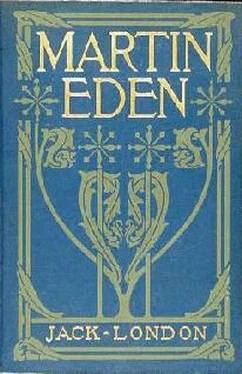How long he sat there he did not know, until, suddenly, across his sightless vision he saw form a long horizontal line of white. It was curious. But as he watched it grow in definiteness he saw that it was a coral reef smoking in the white Pacific surges. Next, in the line of breakers he made out a small canoe, an outrigger canoe. In the stern he saw a young bronzed god in scarlet hip-cloth dipping a flashing paddle. He recognized him. He was Moti, the youngest son of Tati, the chief, and this was Tahiti, and beyond that smoking reef lay the sweet land of Papara and the chief’s grass house by the river’s mouth. It was the end of the day, and Moti was coming home from the fishing. He was waiting for the rush of a big breaker whereon to jump the reef. Then he saw himself, sitting forward in the canoe as he had often sat in the past, dipping a paddle that waited Moti’s word to dig in like mad when the turquoise wall of the great breaker rose behind them. Next, he was no longer an onlooker but was himself in the canoe, Moti was crying out, they were both thrusting hard with their paddles, racing on the steep face of the flying turquoise. Under the bow the water was hissing as from a steam jet, the air was filled with driven spray, there was a rush and rumble and long-echoing roar, and the canoe floated on the placid water of the lagoon. Moti laughed and shook the salt water from his eyes, and together they paddled in to the pounded-coral beach where Tati’s grass walls through the cocoanut-palms showed golden in the setting sun.
The picture faded, and before his eyes stretched the disorder of his squalid room. He strove in vain to see Tahiti again. He knew there was singing among the trees and that the maidens were dancing in the moonlight, but he could not see them. He could see only the littered writing-table, the empty space where the type-writer had stood, and the unwashed window-pane. He closed his eyes with a groan, and slept.
He slept heavily all night, and did not stir until aroused by the postman on his morning round. Martin felt tired and passive, and went through his letters aimlessly. One thin envelope, from a robber magazine, contained for twenty-two dollars. He had been dunning for it for a year and a half. He noted its amount apathetically. The old-time thrill at receiving a publisher’s check was gone. Unlike his earlier checks, this one was not pregnant with promise of great things to come. To him it was a check for twenty-two dollars, that was all, and it would buy him something to eat.
Another check was in the same mail, sent from a New York weekly in payment for some humorous verse which had been accepted months before. It was for ten dollars. An idea came to him, which he calmly considered. He did not know what he was going to do, and he felt in no hurry to do anything. In the meantime he must live. Also he owed numerous debts. Would it not be a paying investment to put stamps on the huge pile of manuscripts under the table and start them on their travels again? One or two of them might be accepted. That would help him to live. He decided on the investment, and, after he had cashed the checks at the bank down in Oakland, he bought ten dollars’ worth of postage stamps. The thought of going home to cook breakfast in his stuffy little room was repulsive to him. For the first time he refused to consider his debts. He knew that in his room he could manufacture a substantial breakfast at a cost of from fifteen to twenty cents. But, instead, he went into the Forum Cafй and ordered a breakfast that cost two dollars. He tipped the waiter a quarter, and spent fifty cents for a package of Egyptian cigarettes. It was the first time he had smoked since Ruth had asked him to stop. But he could see now no reason why he should not, and besides, he wanted to smoke. And what did the money matter? For five cents he could have bought a package of Durham and brown papers and rolled forty cigarettes-but what of it? Money had no meaning to him now except what it would immediately buy. He was chartless and rudderless, and he had no port to make, while drifting involved the least living, and it was living that hurt.
The days slipped along, and he slept eight hours regularly every night. Though now, while waiting for more checks, he ate in the Japanese restaurants where meals were served for ten cents, his wasted body filled out, as did the hollows in his cheeks. He no longer abused himself with short sleep, overwork, and overstudy. He wrote nothing, and the books were closed. He walked much, out in the hills, and loafed long hours in the quiet parks. He had no friends nor acquaintances, nor did he make any. He had no inclination. He was waiting for some impulse, from he knew not where, to put his stopped life into motion again. In the meantime his life remained run down, planless, and empty and idle.
Once he made a trip to San Francisco to look up the "real dirt." But at the last moment, as he stepped into the upstairs entrance, he recoiled and turned and fled through the swarming ghetto. He was frightened at the thought of hearing philosophy discussed, and he fled furtively, for fear that some one of the "real dirt" might chance along and recognize him.
Sometimes he glanced over the magazines and newspapers to see how "Ephemera" was being maltreated. It had made a hit. But what a hit! Everybody had read it, and everybody was discussing whether or not it was really poetry. The local papers had taken it up, and daily there appeared columns of learned criticisms, facetious editorials, and serious letters from subscribers. Helen Della Delmar (proclaimed with a flourish of trumpets and rolling of tomtoms to be the greatest woman poet in the United States) denied Brissenden a seat beside her on Pegasus and wrote voluminous letters to the public, proving that he was no poet.
The Parthenon came out in its next number patting itself on the back for the stir it had made, sneering at Sir John Value, and exploiting Brissenden’s death with ruthless commercialism. A newspaper with a sworn circulation of half a million published an original and spontaneous poem by Helen Della Delmar, in which she gibed and sneered at Brissenden. Also, she was guilty of a second poem, in which she parodied him.
Martin had many times to be glad that Brissenden was dead. He had hated the crowd so, and here all that was finest and most sacred of him had been thrown to the crowd. Daily the vivisection of Beauty went on. Every nincompoop in the land rushed into free print, floating their wizened little egos into the public eye on the surge of Brissenden’s greatness. Quoth one paper: "We have received a letter from a gentleman who wrote a poem just like it, only better, some time ago." Another paper, in deadly seriousness, reproving Helen Della Delmar for her parody, said: "But unquestionably Miss Delmar wrote it in a moment of badinage and not quite with the respect that one great poet should show to another and perhaps to the greatest. However, whether Miss Delmar be jealous or not of the man who invented ‘Ephemera,’ it is certain that she, like thousands of others, is fascinated by his work, and that the day may come when she will try to write lines like his."
Ministers began to preach sermons against "Ephemera," and one, who too stoutly stood for much of its content, was expelled for heresy. The great poem contributed to the gayety of the world. The comic verse-writers and the cartoonists took hold of it with screaming laughter, and in the personal columns of society weeklies jokes were perpetrated on it to the effect that Charley Frensham told Archie Jennings, in confidence, that five lines of "Ephemera" would drive a man to beat a cripple, and that ten lines would send him to the bottom of the river.
Martin did not laugh; nor did he grit his teeth in anger. The effect produced upon him was one of great sadness. In the crash of his whole world, with love on the pinnacle, the crash of magazinedom and the dear public was a small crash indeed. Brissenden had been wholly right in his judgment of the magazines, and he, Martin, had spent arduous and futile years in order to find it out for himself. The magazines were all Brissenden had said they were and more. Well, he was done, he solaced himself. He had hitched his wagon to a star and been landed in a pestiferous marsh. The visions of Tahiti-clean, sweet Tahiti-were coming to him more frequently. And there were the low Paumotus, and the high Marquesas; he saw himself often, now, on board trading schooners or frail little cutters, slipping out at dawn through the reef at Papeete and beginning the long beat through the pearl-atolls to Nukahiva and the Bay of Taiohae, where Tamari, he knew, would kill a pig in honor of his coming, and where Tamari’s flower-garlanded daughters would seize his hands and with song and laughter garland him with flowers. The South Seas were calling, and he knew that sooner or later he would answer the call.
Читать дальше












